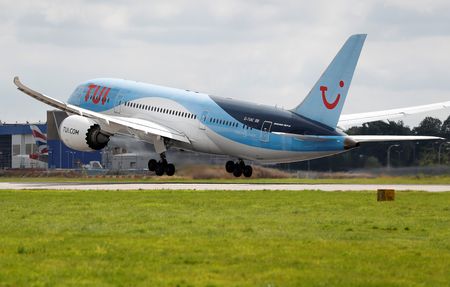 1
1 1
1

By Yadarisa Shabong
(Reuters) -TUI, one of the world’s largest tour operators, took a 75 million euros ($77 million) hit in the third quarter from flight disruption across Europe, pushing it to a loss on Wednesday.
Incoming Chief Executive Sebastian Ebel said there would be significant but lower costs related to air disruption in the fourth quarter, with air traffic normalising in recent days.
“The whole system is still very fragile, and we have days with hardly any disruptions, and we have weeks and days with a lot of disruptions,” Ebel, who is replacing long-time chief Friedrich Joussen in October, told journalists.
The extra costs however come as demand holds up, with summer holiday bookings on track to reach near pre-pandemic levels in 2022. The group still expects to return to significant profits this year.
The German company, which runs tour operators, travel agencies, airlines, hotels and cruise liners in holiday destinations across the world, reported an underlying operating loss of 27 million euros for the three months to June 30.
Without the costs related to the roughly 200 flight cancellations the company suffered, mainly affecting departures from Manchester airport in northwest England, TUI said it would have made an adjusted operating profit of 48 million euros in the quarter.
Its shares were down 0.6% in Frankfurt and London by 0827 GMT.
Airports across Europe have seen chaotic scenes in the past few months as staff shortages led to long queues and flight cancellations, while labour strife added to the travel sector’s woes.
TUI said summer bookings in the quarter stood at 90% of 2019 levels, and had risen to 93% in July and August as people reserve hotels at short notice, stay longer and splurge on their trips.
Average selling prices in the quarter were 18% ahead of three years ago and the group said it would moderately increase hotel prices in coming years.
Hoteliers such as IHG, Marriott and Hilton have also seen strong demand in the quarter and profitability inching closer to pre-crisis levels.
Bookings for the winter are at an early stage, TUI said, with only the UK market starting to take reservations. Volumes there were up 16% versus winter 2018/19.
Rising inflation that has tightened the cost of living crisis could lead to lower bookings, Ebel said, so the group is cautious when it comes to capacity, but he added he expects stable demand in a more challenging environment.
($1 = 0.9788 euros)
(Reporting by Yadarisa Shabong in Bengaluru; Editing by Rashmi Aich and David Holmes)